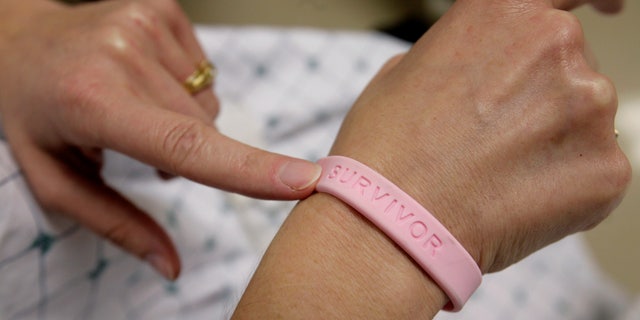Advertisement

Patients diagnosed with early-stage breast cancer who have responded well to targeted cancer treatment—also known as adjuvant therapy—prior to surgery may be able to skip surgery and receive radiation treatment, with a low chance of the cancer coming back.
That’s according to a new study by researchers at the University of Texas MD Anderson Cancer Center, one of the world’s most respected centers dedicated solely to the care and research of cancer patients.
“This research adds to the growing body of evidence showing that newer drugs can completely eradicate cancer in some cases, and very early results show that we can safely eliminate surgery in this select group of women with breast cancer,” said principal investigator Henry Kuerer , MD, Ph.D., in a press release.
BREAST CANCER AND MAMMOGRAM: 3 KEY QUESTIONS WOMEN OF ANY AGE SHOULD ASK BEFORE THEIR EXAM
He is Professor of Breast Surgical Oncology at the University of Texas MD Anderson Cancer Center in Houston, Texas.
The results of the phase II study were published in the Lancet Oncology.

“This research adds to the growing body of evidence showing that newer drugs can completely eradicate cancer in some cases, and very early results show that we can safely eliminate surgery in this select group of women with breast cancer,” said principal investigator Henry Kuerer , MD, Ph.D.
(iStock)
Researchers assessed the likelihood of breast cancer recurrence in patients who were considered in full remission after undergoing chemotherapy and radiation without surgery.
Thirty-one of the 50 patients followed had a complete response to chemotherapy — and none had breast tumor recurrence after a median follow-up of 26.4 months, the study said.
The patients received specific cancer therapies and chemotherapy before the operation.
“These types of breast cancer usually come back [the] first few years, like that [the] brief follow-up studies showed promising results,” said Dr. Kuerer Fox News Digital in an interview about the study.
Patients received specific cancer therapies and chemotherapy before surgery, Keurer told Fox News Digital.
BREAST CANCER BY KATIE COURIC: WHAT OTHER WOMEN CAN LEARN FROM HER DIAGNOSIS
“Patients are often operated on first, but these targeted therapies increase survival. So give it first — it shrinks tumors and allows for a lumpectomy vs. mastectomy,” he said in an interview.
The multicenter study enrolled 50 women over 40 years of age with triple-negative or HER2-positive early-stage breast cancer and a residual breast lesion of less than 2 centimeters after standard chemotherapy.
If no cancer was found on biopsy, breast surgery was not performed and patients continued with standard radiotherapy.
Patients underwent image-guided vacuum-assisted core biopsy (VACB).
SINGER KELLY LANG ABOUT HER 17-YEAR BREAST CANCER BATTLE: ‘I PROMISE GOD I WILL BE A BRIGHT LIGHT TO OTHERS’
If no cancer was found on biopsy, breast surgery was not performed and patients continued with standard radiotherapy.
Of the participants, the VACB identified 31 patients with a pathologic complete response — meaning a pathologist doesn’t see cancer in the tissue where the tumor was located.

“While these results are remarkable and quite promising, it is important for patients to know that this is the beginning of a new type of treatment for select patients,” said study investigator Henry Kuerer, MD, Ph.D., of the new study .
(iStock)
“Patients who responded well to therapy and imaging evidence showed that the tumor was responding well — instead of surgery, we used imaging biopsy in these patients and skipped surgery,” said Kuerer.
He also explained that the high response rates combined with selective image-guided VACB and rigorous histological processing (examination of tissues and cells) have improved physicians’ ability to identify those patients who may not need surgery.
He said the biopsy protocol designed by the MD Anderson Clinic had been shown to be fairly accurate in previous research by the researchers.
BREAST CANCER AWARENESS: KAYLEIGH MCENANY, GERRI WILLIS, JACKIE DANGELIS OF FOX NEWS GET REAL ABOUT DIAGNOSIS
“We developed, tested and implemented the technique in 2018 and found 98% accuracy in this biopsy protocol,” he said.
Kuerer also warned that more research is needed before this process is made the standard of care.

The team of dr. Keurer, of the University of Texas MD Anderson Cancer Center, noted that this is a small, non-randomized study — and that larger randomized trials are needed before changes in the standard of care can be considered.
(REUTERS/Jim Bourg)
“Until further notice, standard breast cancer surgery is still necessary,” said Kürer.
“While these results are remarkable and promising, it is important for patients to know that this is the beginning of a new type of treatment for select patients.”
He added, “Much longer follow-up and further studies are needed before this approach can be incorporated into routine breast cancer management.”
Keurer said the researchers would continue to follow these patients to monitor their long-term outcomes.
His team noted that this is a small, non-randomized study – and that larger randomized studies are needed before changes in the standard of care can be considered.
“This is a very interesting and thought-provoking study.”
“This is a very interesting and thought-provoking study,” Sarah P. Cate, MD and director of the Breast Surgery Quality Program at Mount Sinai Health System in New York, told Fox News Digital.
“There are a few clinical trials nationwide that are looking at avoiding surgery for breast cancer,” said Cate, who was not involved with the study.
CLICK HERE TO SUBSCRIBE TO OUR LIFESTYLE NEWSLETTER
“However, long-term follow-up is required for these studies to extrapolate to general breast cancer patients, and we know they can safely be offered.”
CLICK HERE TO GET THE FOX NEWS APP
Cate, who is also director of the dedicated monitoring and breast program at Mount Sinai Health System, added: “This study also had a very small number of patients treated without surgery. Changes in the standard of care would entail a much larger study and many more patients.”

